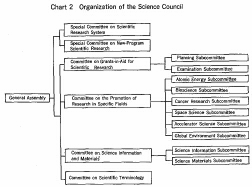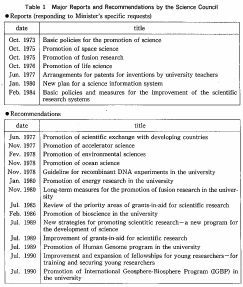| Home > Policy > White Paper, Notice, Announcement > White Paper > JAPANESE GOVERNMENT POLICIES IN EDUCATION,SCIENCE AND CULTURE1991 > Part |
||
In the promotion of scientific research, it is important that opinions of scientists are properly reflected in policy making. In order to guarantee this, the Ministry has set UP deliberative and advisory organs such as the Science Council, the Geodesy Council and the University Council, which are mainly composed of leading researchers in specific fields of science. The Japan Society for the Promotion of Science has been set up to effectively implement policies for promoting scientific research. Also the Japan Academy has been set up to provide special incentives to those who have made outstanding contributions to the advancement of science, as well as to implement programs necessary for the development of science.
Brief descriptions about these organs are as follows:
The Science Council has been set up to examine important matters in the field of science as requested by the Minister of Education, Science and Culture, and to give advice and suggestions to the Minister. It is composed of 27 members and some 1,600 expert members are nominated for special tasks such as the screening of research proposals requesting grants-in-aid for scientific research.
In 1973, the Council submitted a major report on "Basic Policies for the Promotion of Science." Since then the Council has successively submitted reports and recommendations to the Minister, some on measures for developing priority areas, such as space science, nuclear fusion research, life science and ocean research, which would need special primitive measures, and others on ideal features of scientific research systems. These reports and recommendations were subsequently reflected in the science policy of the Ministry.
In 1984 the Council submitted the report on "Basic Policies and Measures for the Improvement of the Scientific Research Systems" in which the Council systematically outlined the basic concepts and measures for the comprehensive and effective development of science policies in light of changing circumstances.
At present, the Council is deliberating on "strategies for comprehensive promotion of scientific research with the prospect of the 21st century."

The Geodesy Council has been set up to deliberate on geodesy and geodesic programs conducted by various government agencies and to present recommendations to the Minister of Education, Science and Culture and other Ministers concerned with matters which the Council regards as necessary. The Council is composed of the Geodesy Subcommittee, the Earthquake and Volcano Subcommittee, the Upper Atmosphere Subcommittee, the Atmosphere and Hydrosphere Subcommittee and several other special committees, and examines tendencies of relevant research activities in a wide range of areas, presents tasks to be set for the future and suggests measures to achieve them.
Recently the Council has proposed the implementation of international cooperative programs such as the Ocean Drilling Program (ODP) and the Solar and Terrestrial Energy Program (STEP). The Council has also advised the Government about measures for predicting earthquakes and volcanic eruptions which are of great concern to the public in Japan.

The University Council was established in the Ministry of Education, Science and Culture in 1987. Its function is to investigate and deliberate on basic matters of universities and other institutions of higher education. The Council accepts deliberation from wide-ranging viewpoints and considers requests from both the university related sectors and other social sectors concerning the Ministry's policies. The ultimate aim of the Council is to promote further development of universities in order for them to better meet national and social expectations.
The Council, consulted by the Minister about "specific strategies
for the advancement, individualization and activation of education and research
in universities and other institutions of higher education," has since continued
to work on many issues. By now, the Council has submitted reports successively
on the flexibility of graduate school systems, the enrichment of graduate schools,
there consideration of academic degree systems. the evaluation of graduate schools,
and the amendment of the Standards for the Establishment of Universities, the
Standards for the Establishment of Graduate Schools and the Regulation on Academic
Degrees, etc.
The Japan Academy is an honorary organization which affords preferential treatment to those who have made outstanding contributions to the advancement of science. It was founded in 1879, over 110 years ago, as the Tokyo Academy. The total number of members is limited to 150. They are elected from among the most eminent scholars in their respective fields and they are provided with an annuity.
The Academy awards the Japan Academy Prizes annually, of which
one or two are distinguished as the Imperial Award for outstanding scientific
achievements. The Japan Academy Prize is regarded as the highest in Japanese
academia. In addition, the Academy awards the Duke of Edinburgh Prize for the
Japan Academy.
Japan Society for the Promotion of Science
The Japan Society for the Promotion of Science was set up for the purpose of implementing various programs in close connection with government policies to promote science through flexibly meeting researchers' needs. The Society was originally established in 1932 with an Imperial Grant as a private foundation. After its establishment, it endeavored to promote scientific research until it was reorganized in 1967 to become a special juridical person under the auspices of the Ministry of Education, Science and Culture in order to further expand its activities.
The Society is operated chiefly through government subsidies.
Its various programs for the promotion of scientific research are aimed at assisting
researchers in carrying out their research activities and participating in international
cooperative programs in science.
The Council for Science and Technology is chaired by the Prime Minister and consists of the Policy Committee and several subcommittees. It deliberates on the Government's overall basic policy on science and technology. The Science and Technolozv Agency acts as the secretariat of the Council, but matters concerning scientific research in universities are jointly dealt with by the Science and Technology Agency and the Ministry of Education, Science and Culture.
In 1984, the Council submitted its report in which it advocated
fundamental principles in the national science and technology policy, designed
to cope with any new changes. The report emphasized the importance of developing
science policies with the following objectives ; 1) to promote creativeness in
science and technology, 2) to promote science and technology in good harmony
with individuals and society, and 3) to promote international exchange and cooperation
in science and technology. At present the Council is deliberating on a revision
of its 1984 report which concerns the overall fundamental principles of science
and technology with the prospects for the 21st century.
The Science Council of Japan is part of the Prime Minister's Office and is the representative organ of Japanese scientists. The Council's objectives include the advancement of science, as well as the permeation of science in public administration, industry, and society. Its functions cover: 1) deliberating on important matters concerning science and making efforts to implement any decisions reached, and 2) co-ordinating scientific research, as a means of enhancing the efficiency of research efforts.
The Council is composed of 210 members appointed from among the candidates recommended by the registered academic societies. It submits various recommendations and proposals to the Government, which mostly concern the Ministry of Education, Science and Culture. These are implemented according to administrative feasibility.
| Back to Top | MEXT HOME |